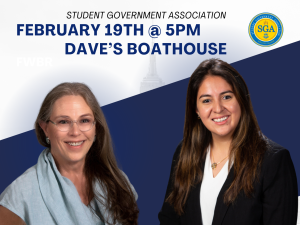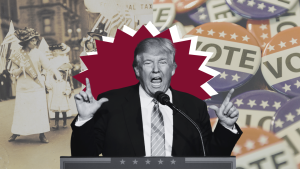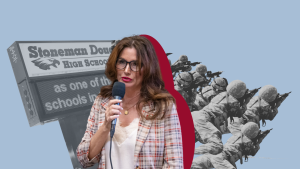On Feb. 20, Rollins College, through the Winter Park Institute, hosted the last director of Central Intelligence, Porter Goss, for a talk on the United States and its relationship with the world at large. With Bush Auditorium packed to the brim, the program began with a bit of background on Goss and his many achievements. The program noted when Goss received his Bachelor of Arts in classical Greek from Yale University, when he served eight consecutive terms in the House of Representatives, and when he led Everglade’s legislation and took great pride in the passage of the Ricky Ray Bill (a bill that offered relief to victims who contracted HIV through a contaminated blood supply), just to name a few.
Goss began his speech with some “prepared remarks” about how some Americans view the world. He noted that it is difficult for many Americans to comprehend the fact that we are at war with fanatics because the fanatics hate Americans for who we are and what we stand for. He stated that we are “in a battle for the hearts and minds of the whole world,” and that this concept of “Brand U.S.A” is vitally important. To punctuate the importance of the matter, he discussed the many reasons why having such a talk would “not be tolerated” and not able to occur in countries where these Islamic fanatics live. These reasons include: our lack of a strict dress code, the fact that there were unveiled women in the audience, our views on the sanctity of life, and the basic nature of asking questions and having such a discourse in this public of a setting. After 10 years, Goss stated that neither side can claim a win, and with the terrorists’ radical ideology and lack of “civilized behavior” and “rules of engagement,” their beliefs do not allow them to surrender, and that everything they do is only to be pleasing to Allah. In the words of Goss: We fight for freedom, they fight for a ticket to paradise.
Goss then began to get into the crux of his speech, which he said was broken down into “eight facts, seven triggers, six questions, five domestic facts, four thoughts on regime change, three plugs and two reminders,” and joked that, unfortunately, it would not end with “a partridge in a pear tree.” He spent the majority of his time going into each category and talking about the United States and the foreign policy issues that face us to this day. Goss stated that the enemy is not only real, but is using an unconventional warfare that “creates anxiety” and brings up cost of war on our end. To Goss: “The world truly is a sorry mess.” Discussing topics such as nuclear proliferation, regime change, political correctness, and the polarization of intelligence, Goss weaved a narrative that stressed the fact that the world is still a very dangerous place and the threat of terror and war are still very real. “The world is counting on the U.S.,” said Goss, and for us to succeed, we must understand the world today. He concluded his speech by stating that “I’m a very proud American,” and while it is “wonderful to be popular and loved,” it is much better to be respected for our values.
After his speech, Goss held a Q&A session. Here, he said that if push came to shove and survival mode set in, that yes, Israel may act against Iran without the United States’ approval. On the same matter, though, he said that he did not believe that Ayatollah Khamenei, the Supreme Leader of Iran, would be the one to strike first. Concerning the United States and its role in said conflict and similar ones in North Africa and the Middle East, Goss stated that we should help in places we are welcome and for the right reasons. When asked if he were president, what he would do in regard to Iran, he said that he does not believe the United States should engage in military action and that we would pursue aggressive sanctions and cease to negotiate with the Islamic Republic. In another question, however, Goss stated that if the U.S. did get involved, it would not go to “defend Israel,” but instead to promote “regional stability.”
Then Goss addressed the matter of preventing “misinformation” on the account of the Central Intelligence Agency from affecting the U.S.’ decision to go into future. He said that new measures have been put into place to make sure that all information is as accurate and up to date as possible, such as getting people who understand the language and culture and having a better verification process in place, yet he stated that the agency works its hardest to make sure it always has the most correct information available.
With a question or two more on the Patriot Act and even some asking how their sons could get into the CIA (drawing a chuckle or two), the night finally came to an end, and everyone in attendance had much to think about in terms of America and the state of the world in which we live.


















Be First to Comment